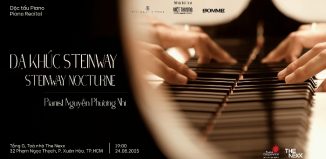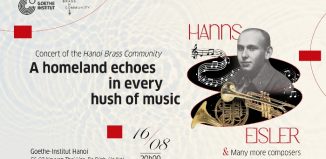Jazz Musician Nguyễn Bảo Long: “Jazz Club is like a school” (P2)
Interview by Uyên Ly for Long Waits and Hanoi Grapevine
Supported by Minh Hiếu
Image provined by Long Waits
Kindly credit Hanoi Grapevine when sharing the article.
Please do not copy or repost without permission.

Let’s take a look back at the one-year journey of Long Waits with its co-founder, the soulful and steadfast saxophonist Nguyễn Bảo Long. (Read part 1 of the interview here)
What are your future plans for Long Waits?
In the future, I want Long Waits to be similar to a small theatre, featuring plays, cinema, classical music and various other art forms, as long as artists are serious about their work, not just jazz. For example, I want to have a session where people can use cameras and mix, edit footage on the spot, allowing everyone to participate, watch and learn together.
Currently, Long Waits only has performances on Fridays and Saturdays; the other days are for film screenings – musicals or classic movies.
No one knows what the future holds, but as long as I have the strength, I want the lights to stay on at Long Waits.
I envision a jazz club in every neighbourhood. In developed countries, this is an everyday sight because that is their social need. Here, we have more shopping centres than cultural centres. I even promise those who want to get to work on this matter that I’m more than ready to share my experiences. If we want to do it, we ought to do it right, with quality, not just for income.
The hardest thing in jazz is endurance and resilience. You might sometimes catch sights of famous artists flying in planes, driving fancy cars or living in expensive houses. But in jazz, you rarely see historically renowned jazz artists living a luxurious life. It’s not that they couldn’t afford luxury, but that’s the life they chose to pursue their art.
Why endurance? Why resilience?
In music, the most important thing is the self and the energy for interpretation. One may already have the self, but energy is needed for interpretation. A fulfilled, happy artist can play well. But an artist who chooses a life with enough pressure for that energy can have a more enduring musical pursuit.
I grow as I play jazz. I grow as I learn about jazz artists. Then, I understand that when you separate yourself from societal needs, you are free to convey yourself with untainted energy, like doing a show at the Opera House without sponsorship. That is how we keep our energy pure. The deeper I delve into jazz, the more I realise this is true. And it’s crucial that my family support me in this. Otherwise, I would have to accept sponsorship to have money to bring home. I deeply appreciate that my loved ones respect my decisions, which is very difficult.
Are you using jazz to “cultivate” yourself (tu tập), a term quite popular nowadays?
Not to that extent, but you have to detach yourself from societal needs quite a bit. For example, if you keep thinking you need a house, a car, a watch or something else along that line, if you keep pursuing those, then you can’t play pure music. Nowadays, there are private parties where rich people want to hear a few songs. Some like the trumpet, others like dance. An artist who wants to express their unique self and follow their own musical path, after playing at such events and bringing home tens of millions of Vietnamese dong, will not have enough energy to do something greater. So, you need to learn to say no.
But if you could perform twice every month to live comfortably, why refuse?
It’s true that we might agree to take the money and use it to do other things we want. But in music, there are things we would like to do, such as playing large collections or composing for ourselves, that cannot be bought with money. Climbing the ladder of things money can buy are not what I’m interested in. For me, spending two nights to earn some cash is not of much significance.
I had left the glamorous phase of playing pop music behind. Now something different is on my plate.

What is “something different” other than Long Waits?
Now my album is in the final stage of production. It took me two years to write, made with a chamber orchestra. I wouldn’t be able to create this if I had a few billions of đồng in my pocket, because I need the energy and the concentration. Money has very little influence on creative energy. Money may solve things quickly in some cases, but it doesn’t help much with what I am doing.
And then there’s ethics. If you want to do something great and want others to see your influence so that they trust your direction, but then you turn around and sell your art for cheap, then very quickly, no one will follow you anymore.
Regarding the album, it took me two years to write, and this morning (on the day of this interview – writer’s note), I just finished mixing the final track. After mixing comes mastering. It will take about a month and a half more for duplication. Hopefully, the album will be released in about three months.
I’ve made several albums before. This is the fifth or sixth one, I don’t remember exactly. So that means I’ve released quite a few records in the last 5-6 years. Before that, I was simply playing music and teaching.
What if you’re being “pure” like this and your children said they want to go study abroad? How could you afford that?
I’m lucky to have three sons. My principle for raising them is to let them grow up in hardship. My stance is to let them study at public universities, not private ones. Public school students have great resilience and endurance. I want all three of my children to attend public schools. The eldest is studying law at the national university. The second is only six years old, and the youngest is just six months old, so we don’t know how that would turn out to be yet. Fortunately, I have a family that understands and respects what I do. If my wife insisted on sending them abroad, that would be tough.
How do you stay pure and still keep the balance to survive?
Up until the 1950s-1960s, the jazz club model made profits until the US banned bootleg liquor, stimulants, and prostitution (backdoor activities of jazz clubs). For me, the profit of a jazz club is how it survives time. I am very grateful to Tuấn Anh and Hùng for joining hands with me and investing in this. When I look back on our investment, I don’t see our profit in terms of capital, but how we make it through each day. Every day that the club still exists, there is profit. Moving forward means accepting new pressures and relieving old ones. Business-wise, I cannot do it alone, so I have Tuấn Anh and Hùng working on that.
Many international artists came here to play, and as they stepped out of the door, they told me, ‘I know doing this won’t make you rich, it’s the same around the world. But just do it.’ That’s true. No one gets married thinking they will get rich. They are happy to be with their spouse because of love. Once it’s love, profit is discarded to the side. It’s a commitment.
I hope that other people will understand that if they want to start a place like this, then they should open it. If they want their club open this month and generate profits in the next, then take a step back. People come here for the beauty of the time they spend here. The more time spent on beauty, the better society becomes.

Have you done everything you want to do?
It is a bit all over the place. I work with the energy I have each day. For example, I plan two albums this year, and if I have some extra energy, I’ll make them a bit more complex. Next year, I don’t know what my plan will be yet, but I’ll probably do it with all my energy.
How is your daily life going?
During the day, I take my children to school in the morning and have a 30-minute coffee break. I spend two to three hours afterwards writing music, the same for the afternoon. Part of it is composing, and part is practicing the saxophone. After the compositions are finished, I turn them into an album, then record and mix. A project can be done quickly in six months, or it can look like what I’m working on now, which takes two years. Of course, I also do other things during those two years, and sometimes they overlap. On weekends, I play here (at Long Waits). I finalise the weekend programme at the beginning of the week so everyone knows what we’re working on for the weekend and they can design the posters. An artist’s greatest happiness is to create art, so right now I’m happy. I get to dedicate myself and work on the purest things, rather than counting how much I bring home.
Are hardship and resilience your life principles?
For me, sorrow, joy, or depression all bring energy, which I use to create. And I know how to channel that energy into creativity. I want my energy to be more multidimensional and more emotive, that way, it’s not monotonous. My nature leans towards negative energy, so I prefer challenges over ease. The only important thing is that if I decide to do something, I will commit to it. It’s difficult in art, because it’s about self-study and self-creation. If you don’t know how to commit to yourself and you compromise, then you won’t be able to create, or if you do, your work won’t bear your identity.
What challenges did you set for yourself during album production?
For each project, I often review to see if anyone has done that format or genre before. If there is, I won’t do it. This project combines strings, symphonic percussion, Japanese percussion, and a jazz band. It is a combination that is difficult to execute. Even live performances with these elements together are quite rare to find. I didn’t study composition, so when I started working on this, I had to seek out and put pressure on myself, to learn to create combinations that had never existed before. Every hour spent on this project is a challenge because everything is brand new. For me, I will only jump when I know it’s a giant leap, not a small step. That is to explain that a happy life won’t give me enough energy to work./
Thank you very much for your time for this interview.














![[Open Call] Roots & Worlds 2025: Elsewhere, Within](https://hanoigrapevine.com/wp-content/uploads/2025/08/roots-and-worlds-banner-100x65.jpg)


